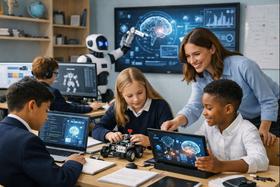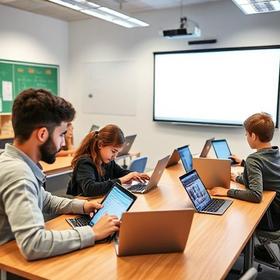What is the state of technology in private schools? In most private schools teachers and students have been using computers since the mid 1990s. Tablets are the norm. Wireless networking and electronic presentation devices such as whiteboards, LCD displays, and projectors are all part of the private school teacher's bag of tricks. In the old days, technology was a curious somewhat fascinating add-on. You went to a computer lab and taught keyboarding or used programs such as MathBlaster. In the 21st century technology supports and enhances all aspects of the curriculum and teaching. Everybody has their own portable computer with the flexibility and efficiency such mobility encourages.
How important is technology in schools?
American University makes the case succinctly as follows: " How important is technology in education? The COVID-19 pandemic is quickly demonstrating why online education should be a vital part of teaching and learning. By integrating technology into existing curricula, as opposed to using it solely as a crisis-management tool, teachers can harness online learning as a powerful educational tool.
The effective use of digital learning tools in classrooms can increase student engagement, help teachers improve their lesson plans, and facilitate personalized learning. It also helps students build essential 21st-century skills."
This TEDTalk discusses how technology makes learning more dynamic and engaging.
Teaching the digital generation
Most students live in a digital world. They have never known analog devices such as calculators and slide projectors. Their world lives on their smartphone. Most smartphones have thousands of times the computing power of those first computer devices like the Apple and IBM PC. Remember them? Well, you and I may remember them. But K-12 students today have no clue about such technological artifacts.
Back in the infancy of the computer age, the technology/math teacher - yes, he or she was a hybrid - taught BASIC. Everybody had to learn how to code. In those early days before a GUI (Graphic User Interfaces) such as Windows, the idea was to teach students how to make these new-fangled machines perform useful functions such as printing. In the 21st-century middle school students learn how to write apps.
Coding has not disappeared from school curricula. It has resurfaced in exciting forms such as robotics and AI (Artificial Intelligence).
“Digital education is generating new learning opportunities as students engage in online, digital environments and as faculty change educational practices through the use of hybrid courses, personalized instruction, new collaboration models and a wide array of innovative, engaging learning strategies,” says David Goodrum1, Director of Academic Technology and Information Services at Oregon State University.
This video from Edutopia offers suggestions on how to keep students engage in learning digitally.
Technology transforms the way children learn.
When technology was first introduced into schools several decades ago, many pundits assumed that technology would somehow revolutionize K-12 classrooms. But I remember when I was teaching back in the 90s thinking that computers would enhance my lessons. Technology could expand my students' thinking and allow them to explore ideas and worlds more easily and efficiently than when they used analog tools such as film and overhead slide projectors. My students developed email relationships with students in other countries. They could ask questions and receive answers within minutes, or, in the worst case, hours. It was that immediacy that captivated all of us. Fast forward to 2021. It's precisely that lightning speed with which we can search for information and receive answers that has become second nature. We expect instant answers and become frustrated when our technology systems run slowly.
Technology Enables Online Instruction.
It took the pandemic of 2020-2021 to make educators at every level realize how really useful technology could be. Overnight, schools closed and remained closed for many months, indeed, in some cases, they remained closed much longer than that. Students who had internet access resumed their classes online. In many cases, private schools had already been teaching digitally for several years. Among their challenges was making sure their teachers were teaching in the most appealing, engaging way possible. That's not an easy task when you have fifteen 6th graders on a Zoom or Webex call. Best Practices When Teaching With Zoom gives you an idea of some of the strategies teachers had to master very quickly if they were not already familiar with them.
This video shows us how to use educational technology.
Technology Enhances Education.
As a teacher who has taught at the middle school, high school, and college level, I can tell you unequivocally that technology is a very useful tool in my pedagogical toolkit. It allows me to enrich my lessons and illustrate key points efficiently and effectively. But, in the end, I, the teacher, am still in control. I make the decisions about what materials to present and how to present them. I manage the class, its personalities and the interaction and discussions that occur in any classroom. As Jean-Baptiste Alphonse Karr said in the 1840s, "Plus ça change, plus c'est la même chose" which being translated means "The more things change, the more they stay the same."
Questions? Contact us on Facebook. @privateschoolreview















